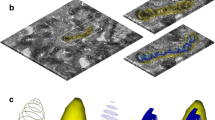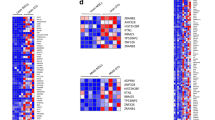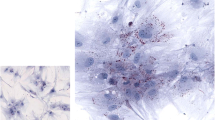Abstract
Mesenchymal stem cells (MSCs) are currently being tested in several clinical trials. Mitochondria regulate many aspects of MSC function. Mitochondrial preproteins are rapidly translated and trafficked into the mitochondrion for assembly in their final destination, but whether coexisting cardiovascular risk factors modulate this process is unknown. We hypothesized that metabolic syndrome (MetS) modulates mitochondrial protein import in porcine MSCs. MSCs were isolated from porcine abdominal adipose tissue after 16 weeks of Lean or MetS diet (n = 5 each). RNA-sequencing was performed and differentially expressed mitochondrial mRNAs and microRNAs were identified and validated. Protein expression of transporters of mitochondrial proteins (presequences and precursors) and their respective substrates were measured. Mitochondrial homeostasis was assessed by Western blot and function by cytochrome-c oxidase-IV activity. Forty-five mitochondrial mRNAs were upregulated and 25 downregulated in MetS-MSCs compared to Lean-MSCs. mRNAs upregulated in MetS-MSCs encoded for precursor proteins, whereas those downregulated encoded for presequences. Micro-RNAs upregulated in MetS-MSCs primarily target mRNAs encoding for presequences. Transporters of precursor proteins and their substrates were also upregulated, associated with changes in mitochondrial homeostasis and dysfunction. MetS interferes with mitochondrial protein import, favoring upregulation of precursor proteins, which might be linked to post-transcriptional regulation of presequences. This in turn alters mitochondrial homeostasis and impairs energy production. Our observations highlight the importance of mitochondria in MSC function and provide a molecular framework for optimization of cell-based strategies as we move towards their clinical application.






Similar content being viewed by others
References
Spees, J. L., Lee, R. H., & Gregory, C. A. (2016). Mechanisms of mesenchymal stem/stromal cell function. Stem Cell Research & Therapy, 7, 125.
Hosseinikia, R., Nikbakht, M. R., Moghaddam, A. A., et al. (2017). Molecular and cellular interactions of allogenic and Autologus mesenchymal stem cells with innate and acquired immunity and their role in regenerative medicine. International Journal of Hematology-Oncology and Stem Cell Research, 11, 63–77.
Badimon, L., Onate, B., & Vilahur, G. (2015). Adipose-derived mesenchymal stem cells and their reparative potential in ischemic heart disease. Revista Espanola de Cardiologia (Engl Ed), 68, 599–611.
Hickson, L. J., Eirin, A., & Lerman, L. O. (2016). Challenges and opportunities for stem cell therapy in patients with chronic kidney disease. Kidney International, 89, 767–778.
Friedman, J. R., & Nunnari, J. (2014). Mitochondrial form and function. Nature, 505, 335–343.
Marycz, K., Kornicka, K., Basinska, K., & Czyrek, A. (2016). Equine metabolic syndrome affects viability, senescence, and stress factors of equine adipose-derived mesenchymal stromal stem cells: New insight into EqASCs Isolated from EMS horses in the context of their aging. Oxidative Medicine and Cellular Longevity, 2016, 4710326.
Marycz, K., Kornicka, K., Maredziak, M., et al. (2016). Equine metabolic syndrome impairs adipose stem cells osteogenic differentiation by predominance of autophagy over selective mitophagy. Journal of Cellular and Molecular Medicine, 20, 2384–2404.
Marycz, K., Kornicka, K., Grzesiak, J., et al. (2016). Macroautophagy and selective Mitophagy ameliorate Chondrogenic differentiation potential in adipose stem cells of equine metabolic syndrome: New findings in the field of progenitor cells differentiation. Oxidative Medicine and Cellular Longevity, 2016, 3718468.
Lesnik, C., Golani-Armon, A., & Arava, Y. (2015). Localized translation near the mitochondrial outer membrane: An update. RNA Biology, 12, 801–809.
Dudek, J., Rehling, P., & van der Laan, M. (2013). Mitochondrial protein import: Common principles and physiological networks. Biochimica et Biophysica Acta, 1833, 274–285.
Wiedemann, N., Frazier, A. E., & Pfanner, N. (2004). The protein import machinery of mitochondria. The Journal of Biological Chemistry, 279, 14473–14476.
Pawar, A. S., Zhu, X. Y., Eirin, A., et al. (2015). Adipose tissue remodeling in a novel domestic porcine model of diet-induced obesity. Obesity (Silver Spring), 23, 399–407.
Zhu, X. Y., Ma, S., Eirin, A., et al. (2016). Functional plasticity of adipose-derived stromal cells during development of obesity. Stem Cells Translational Medicine, 5, 893–900.
Eirin, A., Riester, S. M., Zhu, X. Y., et al. (2014). MicroRNA and mRNA cargo of extracellular vesicles from porcine adipose tissue-derived mesenchymal stem cells. Gene, 551, 55–64.
Calvo, S. E., Clauser, K. R., & Mootha, V. K. (2016). MitoCarta2.0: An updated inventory of mammalian mitochondrial proteins. Nucleic Acids Research, 44, D1251–D1257.
Agarwal, V., Bell, G. W., Nam, J. W., & Bartel, D. P. (2015). Predicting effective microRNA target sites in mammalian mRNAs. Elife, 4.
Coronnello, C., & Benos, P. V. (2013). ComiR: Combinatorial microRNA target prediction tool. Nucleic Acids Research, 41, W159–W164.
Saad, A., Zhu, X. Y., Herrmann, S., et al. (2016). Adipose-derived mesenchymal stem cells from patients with atherosclerotic renovascular disease have increased DNA damage and reduced angiogenesis that can be modified by hypoxia. Stem Cell Research & Therapy, 7, 128.
Eirin, A., Ebrahimi, B., Zhang, X., et al. (2014). Mitochondrial protection restores renal function in swine atherosclerotic renovascular disease. Cardiovascular Research, 103, 461–472.
Zhang, X., Li, Z. L., Crane, J. A., et al. (2014). Valsartan regulates myocardial autophagy and mitochondrial turnover in experimental hypertension. Hypertension, 64, 87–93.
Pattappa, G., Heywood, H. K., de Bruijn, J. D., & Lee, D. A. (2011). The metabolism of human mesenchymal stem cells during proliferation and differentiation. Journal of Cellular Physiology, 226, 2562–2570.
Costello, L. C., & Franklin, R. B. (2013). A review of the important central role of altered citrate metabolism during the process of stem cell differentiation. Journal of Regenerative Medicine & Tissue Engineering, 2.
Chen, C. T., Shih, Y. R., Kuo, T. K., et al. (2008). Coordinated changes of mitochondrial biogenesis and antioxidant enzymes during osteogenic differentiation of human mesenchymal stem cells. Stem Cells, 26, 960–968.
Hsu, Y. C., Wu, Y. T., Yu, T. H., & Wei, Y. H. (2016). Mitochondria in mesenchymal stem cell biology and cell therapy: From cellular differentiation to mitochondrial transfer. Seminars in Cell & Developmental Biology, 52, 119–131.
Folmes, C. D., Dzeja, P. P., Nelson, T. J., & Terzic, A. (2012). Metabolic plasticity in stem cell homeostasis and differentiation. Cell Stem Cell, 11, 596–606.
Garcia-Prat, L., Sousa-Victor, P., & Munoz-Canoves, P. (2017). Proteostatic and metabolic control of Stemness. Cell Stem Cell, 20, 593–608.
Hu, C., Fan, L., Cen, P., et al. (2016). Energy metabolism plays a critical role in stem cell maintenance and differentiation. International Journal of Molecular Sciences, 17, 253.
He, L., & Hannon, G. J. (2004). MicroRNAs: small RNAs with a big role in gene regulation. Nature Reviews Genetics, 5(7):522–31.
Crabbe, M. A. E., Gijbels, K., Visser, A., Craeye, D., Walbers, S., Pinxteren, J., et al. (2016). Using miRNA-mRNA interaction analysis to link biologically relevant miRNAs to stem cell identity testing for next-generation culturing development. Stem Cells Translational Medicine, 5(6):709–722.
Du, J. K., Cong, B. H., Yu, Q., Wang, H., Wang, L., Wang, C. N., et al. (2016). Upregulation of microRNA-22 contributes to myocardial ischemia-reperfusion injury by interfering with the mitochondrial function. Free Radical Biology and Medicine, 96, 406–417.
Jornayvaz, F. R., & Shulman, G. I. (2010). Regulation of mitochondrial biogenesis. Essays in Biochemistry, 47, 69–84.
Ding, W. X., & Yin, X. M. (2012). Mitophagy: Mechanisms, pathophysiological roles, and analysis. Biological Chemistry, 393, 547–564.
Li, Y., Park, J. S., Deng, J. H., & Bai, Y. (2006). Cytochrome c oxidase subunit IV is essential for assembly and respiratory function of the enzyme complex. Journal of Bioenergetics and Biomembranes, 38, 283–291.
Acknowledgements
This study was partly supported by the NIH grant numbers: DK104273, HL123160, and DK102325, DK106427, and the Mayo Clinic: Mary Kathryn and Michael B. Panitch Career Development Award. The funding sources had no involvement in study design, conduct, analysis or interpretation of the results.
Author information
Authors and Affiliations
Corresponding author
Ethics declarations
Conflict of Interest
The authors do not have any financial conflict of interests to disclose.
Research Involving Animals
All experiments were conducted with the approval of the Mayo Clinic Animal Care and Use Committee (approval case number: A00003694–18), which regulates and establishes procedures for the scientific use of animals.
Rights and permissions
About this article
Cite this article
Aghajani Nargesi, A., Zhu, XY., Hickson, L.J. et al. Metabolic Syndrome Modulates Protein Import into the Mitochondria of Porcine Mesenchymal Stem Cells. Stem Cell Rev and Rep 15, 427–438 (2019). https://doi.org/10.1007/s12015-018-9855-4
Published:
Issue Date:
DOI: https://doi.org/10.1007/s12015-018-9855-4




